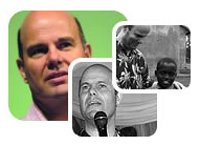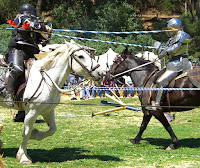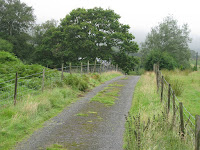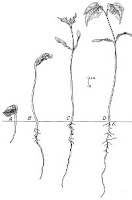 I may decide to sweep up the mess and throw the remains in the bin, the broken pieces are no good for anything. If the pot has sentimental value the best I can do is gather the larger pieces and spend a while with a tube of glue. But it won't fool anyone, it will never be the same again. What was shattered in a moment cannot be mended even if I labour with adhesive for all eternity.
I may decide to sweep up the mess and throw the remains in the bin, the broken pieces are no good for anything. If the pot has sentimental value the best I can do is gather the larger pieces and spend a while with a tube of glue. But it won't fool anyone, it will never be the same again. What was shattered in a moment cannot be mended even if I labour with adhesive for all eternity.I'm happy to say that Papa is a whole lot cleverer than I am.
When a person is broken, shattered into a thousand disjointed shards by circumstances or by the unaware (or all too aware) actions of others, he is capable of making truly invisible repairs. He will never sweep up the mess and throw the remains in the bin. He can rebuild a person so that they are not just mended, but repaired, renewed, and fully restored.
This is a miracle, of course, but what we cannot do is possible for him. It may take much time but he is infinitely patient and he does the work with extreme care and attention, motivated by his perfect love.
He gave us free will and had his reasons for doing so. He will not prevent us from harming one another. Nor will he force restoration when we are determined to resist it. But he is a great encourager, he will leave no stone unturned, and he will never tire in his attempts to woo a broken heart or a shattered soul.
I cannot restore a broken pot to factory new condition. But he can! Just don't ask me how he will do it. I have no idea. All I know is that he reaches out to every one of us in ways we can respond to - even when we believe we can't. Sometimes people say, 'Oh, I understand, I know how you feel', when in truth they have no idea at all. But he does understand.
Mags posted something special and touching yesterday. As I read it tonight I saw a picture of a broken pot. I understood that nobody can restore a broken pot and nobody can restore a broken person. And in that moment I knew I must write about the broken pot.
A pot may have all kinds of functions. It might contain something precious like the jar of nard (John 12:3). But a broken pot can contain - nothing! Restored, it can again contain something precious.
The jar of nard was made to be deliberately broken to release the precious contents - but broken at the right moment and in the right way. The jar was not made to be carelessly dropped, trampled underfoot, or hurled against a wall in anger.
There are two kinds of brokenness. There is the empty brokenness of damage and there is the brokenness of sacrifice. They should never be confused. We must first be restored so that we can contain a treasure, and then we can be broken in a pure, fulfilling, and purposeful way. Broken for glory, broken to bless others, broken to release the treasure contained within us.
How great is the One who restores us, fills us, and shows us how we can be broken for glory and for blessing to release a treasure. He is the treasure! The enemy wants to break us by crushing us, but Abba will break us by loving us. Our breaking will be beautiful like a fragrant flower breaking from the bud or a butterfly breaking from the pupa.
See also:
- Broken pot - Journeys of heart and mind
- Broken pottery becomes art - LifeStream blog
- Pottery lesson - Journeys of heart and mind






























